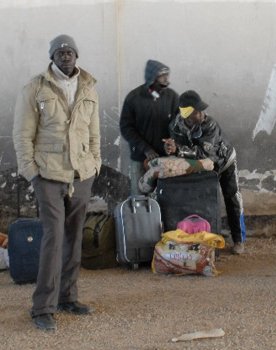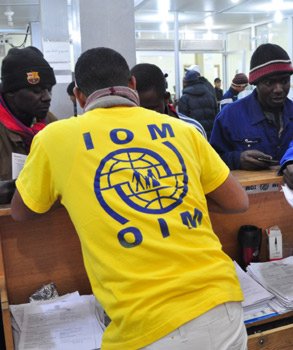|
Africa | Libya Human rights | Society | Politics Fleeing Africans tell tales of Libyan horror
As afrol News earlier has documented, sub-Saharan Africans are systematically harassed, arbitrarily arrested and even killed in "liberated Libya," accused of being "mercenaries" for the Ghaddafi regime. An unknown number, estimated at several hundred thousand African lived in Libya before the revolution, mostly legally working in the country, but many also being irregular migrants and asylum seekers.
At the Tunisian border, the same "bitter tales of targeted treatment in Libya" are told, according to an IOM team there. A group of Eritreans told IOM that "in the 160 kilometres from Tripoli to the Tunisian border, they had been stopped 20 times and totally dispossessed of all their money and belongings." A team of Human Rights Watch (HRW) at the Tunisian border met a group of six Ghanaian construction workers who fled Libya days ago. One of the men said that gangs of youth accusing them of being mercenaries, threatening to kill them. They also said they had been stopped about 10 times along the way to the border manned by people in civilian clothes, who took their phones and searched them, including numerous strip searches. A Chadian migrant, reaching Tunisia, recounted the increasing violence at night-time in Tripoli that had led to great terror among him and other African residents in the Libyan capital. Also the HRW team in Libya has met with African migrants, hearing tales of terror. Roland Omokpia, a 30-year-old electrician from Nigeria, was forced to flee his electrical works shop without his possessions. "I cannot go back to my shop, because they are looking to kill blacks," he said. "The youth came to our area and threatened me, saying, 'There is the black, the black who Ghaddafi hired,' so I had to run away." Last week, a group of Ghanaians that had managed to flee to Egypt told 'BBC4' radio that they were forced "to pose as mercenaries" by Libyans, who later posted their pictures on social media such as YouTube and Facebook. Even in Niger, thousands of terrified Africans are arriving after having crossed the Sahara desert by their own means. These are mostly Ni
The attacks on sub-Saharan Africans in Libya are increasingly concerning humanitarian agencies. The UN refugee agency UNHCR says it has received many reports of Africans "being hunted on suspicion of being mercenaries." UNHCR spokeswoman Melissa Fleming says her agency shares the IOM's concerns that the evacuation of Africans is not going fast enough. Especially at the Tunisian border, Africans meet problems fleeing the country. "We are very concerned that a large number of sub-Saharan Africans are not being allowed entry into Tunisia," Ms Fleming says. According to a UNHCR team in Benghazi, there are 305 Eritreans, 191 Ethiopians and 153 Somalis who have been repeatedly refused evacuation. Most are single young men, with 40 women and three children. There is however one good sign. The group of Africans stranded at the Benghazi port reported to the UNHCR team that "although they faced significant problems in the past two weeks, empathy towards sub-Saharan Africans waiting at the port has increased." Aid workers seemed to have been able to raise awareness of the plights of African migrants among Benghazi citizens. Benghazi authorities now also have established a separate camp for displaced sub-Saharan Africans near Benghazi University, which currently houses at least 1,200 displaced African workers and providing some safety. Meanwhile, most African governments and the African Union have remained silent on both the allegations of "African mercenaries" being stationed in Libya and the systematic attacks on African - with the government of Chad being an exception. No serious efforts have been made to evacuate Africans. By staff writers © afrol News - Create an e-mail alert for Africa news - Create an e-mail alert for Libya news - Create an e-mail alert for Human rights news - Create an e-mail alert for Society news - Create an e-mail alert for Politics news
On the Afrol News front page now
|
front page
| news
| countries
| archive
| currencies
| news alerts login
| about afrol News
| contact
| advertise
| español
©
afrol News.
Reproducing or buying afrol News' articles.
You can contact us at mail@afrol.com










